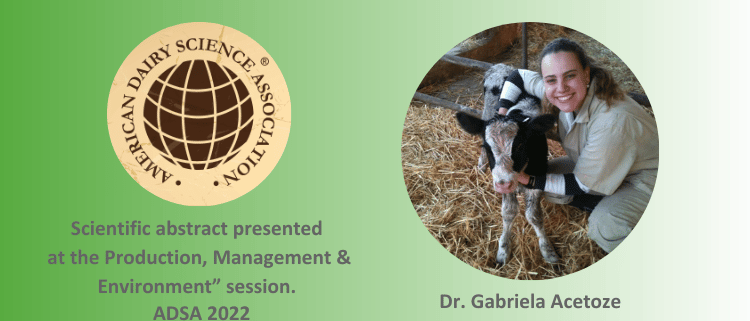Feeding rumen-protected capsicum to dairy cows in transition
The effect of feeding rumen-protected capsicum during the transition period on performance of early lactation dairy cows.
presented at ADSA 2022
American Dairy Science Association, June 20th, 2022, 10:15am
Abstract
by Acetoze G.; Preisinger, K.
A recent study suggests that rumen protected capsicum (RPC) is capable of decreasing blood insulin concentrations (Oh et al., 2017). This decrease could potentially lead to repartitioning of available glucose towards the mammary gland for milk production.
The objective of this study was to evaluate early lactation performance of dairy cows fed RPC during the transition period on a commercial robotic dairy in Indiana. One hundred and five (105) Holstein dairy cows were randomly assigned to two treatments as they entered the pre-fresh pen (-21 days relative to calving): Control (no additive) and Treatment (RPC at 1 g/hd/d). All cows received the same TMR’s (pre-fresh or fresh). RPC was orally administered daily in the pre-fresh pen and provided in the robot grain, manufactured by a commercial feed mill, at the dairy through 60 DIM. The study was conducted beginning in July 2020 and ended in February 2021. Measurements included blood glucose, daily milk yield and components (fat and protein). Statistical analysis was performed using the Repeated Measures model procedure of JMP16 (SAS Institute Inc., Cary, NC).
Energy corrected milk (ECM) and milk yield were significantly (P<0.01) increased (114.5 vs 124.3 lbs/hd/d for ECM and 42.1 vs 44.7 kg/hd/d, control vs treatment, respectively) through 60 DIM for RPC cows. Milk fat (kg/hd/d) was also greater (P<0.01) for RPC cows compared to control (2.04 vs 1.86, respectively). No differences were observed for blood glucose levels (P=0.94). However there was a tendency (P=0.10) for RPC treated multiparous cows to have increased blood glucose 3 days after calving. These results indicate that transition cows supplemented with RPC may have more available glucose available for milk synthesis.
Related articles
Pancosma Phytogenic Bioactives
About the presenter
Gabriela Acetoze, PhD, Ruminant Technical Manager at ADM Animal Nutrition.
Gabriela’s role at ADM involves supporting customer sales, assisting and managing field trials developing data to support sales of ADM Feed Additives and Ingredients and providing internal and external technology trainings. Also, she works closely with the marketing, product management and research teams to help develop, manage and support sales efforts primarily in North America.
Gabriela received her doctorate degree in Animal Biology from University California, Davis where she studied the effects of different feeding strategies on mitochondrial efficiency and proton leak of Holstein dairy cows. She has also earned a master’s degree in Animal Biology at UC Davis investigating the differences of finishing beef cattle on grain or grass finished diets. Gabriela has a BS in Agricultural Engineering from ESALQ – University of Sao Paulo. She started her career as a National Account Manager also for ADM Animal Nutrition developing the sales of ADM Specialty Ingredients in California, Arizona and PNW.




